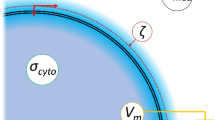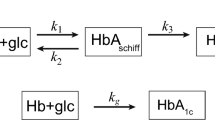Abstract
MANY investigations have been made attempting to relate the potassium content and transport in red blood cells to the glycolytic activity of the cells1,2. Such investigations have utilized red blood cell suspensions which have been stored at low temperatures in order to obtain partial depletion of the cells with respect to potassium.
This is a preview of subscription content, access via your institution
Access options
Subscribe to this journal
Receive 51 print issues and online access
$199.00 per year
only $3.90 per issue
Buy this article
- Purchase on Springer Link
- Instant access to full article PDF
Prices may be subject to local taxes which are calculated during checkout
Similar content being viewed by others
References
Bernstein, R. E., Nature, 172, 911 (1953); Science, 120, 459 (1954).
Maizels, M., J. Physiol., 112, 59 (1951).
Widdas, W. F., J. Physiol., 125, 18P (1954).
Barker, S. B., and Summerson, W. H., J. Biol. Chem., 138, 535 (1941).
Author information
Authors and Affiliations
Rights and permissions
About this article
Cite this article
WRIGHT, R., BRADLEY, T., NELSON, J. et al. Changes in the Potassium Concentration and Metabolism of Red Blood Cells of the Lamb. Nature 182, 1742–1743 (1958). https://doi.org/10.1038/1821742b0
Issue Date:
DOI: https://doi.org/10.1038/1821742b0
This article is cited by
-
Wasser und Elektrolyte in Plasma und Erythrocyten
Zeitschrift f�r Kinderheilkunde (1965)
-
Glucose-6-phosphate Dehydrogenase and Potassium Concentration in Sheep Erythrocytes
Nature (1963)
Comments
By submitting a comment you agree to abide by our Terms and Community Guidelines. If you find something abusive or that does not comply with our terms or guidelines please flag it as inappropriate.



